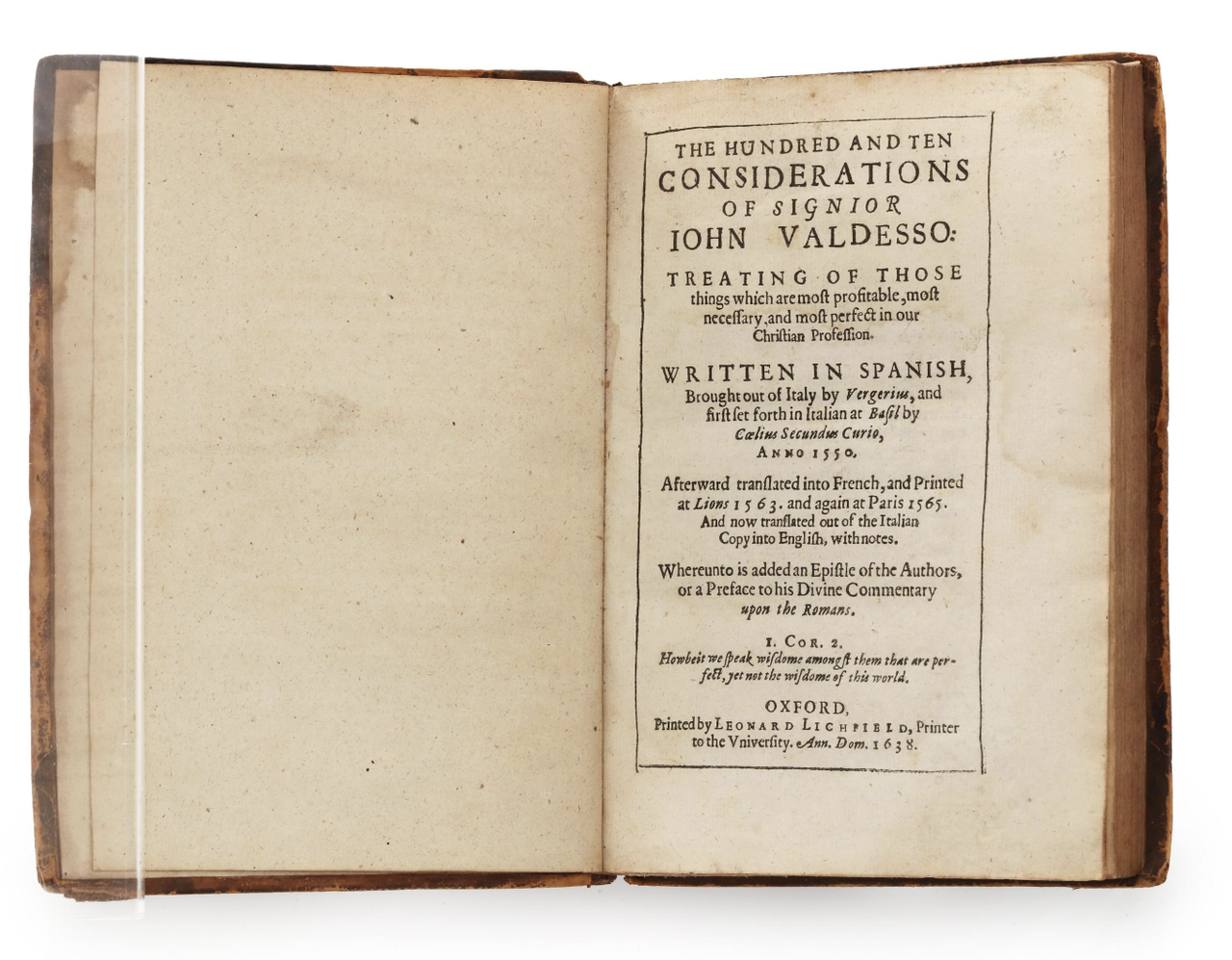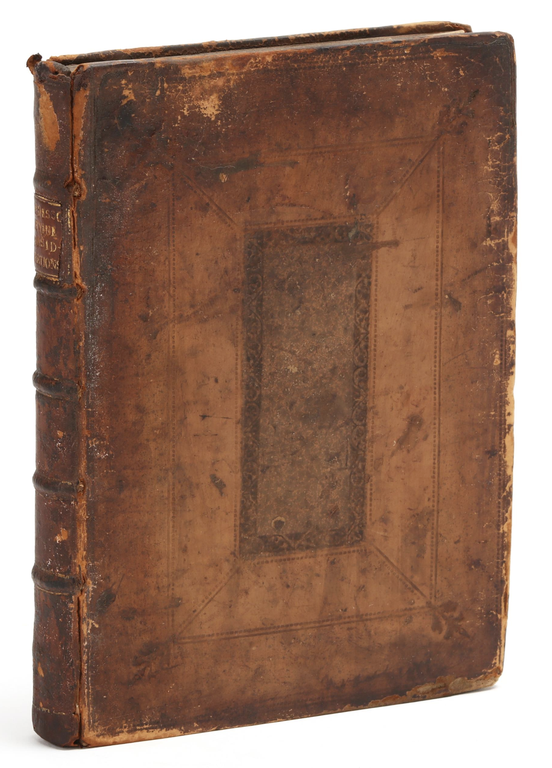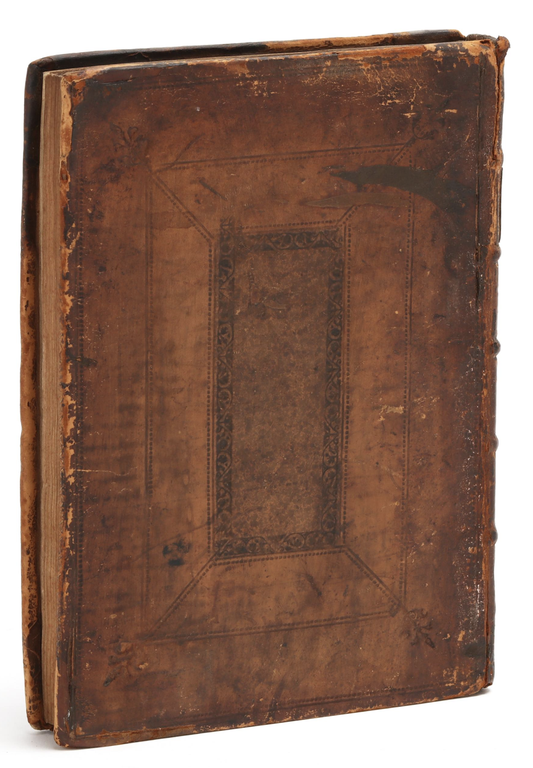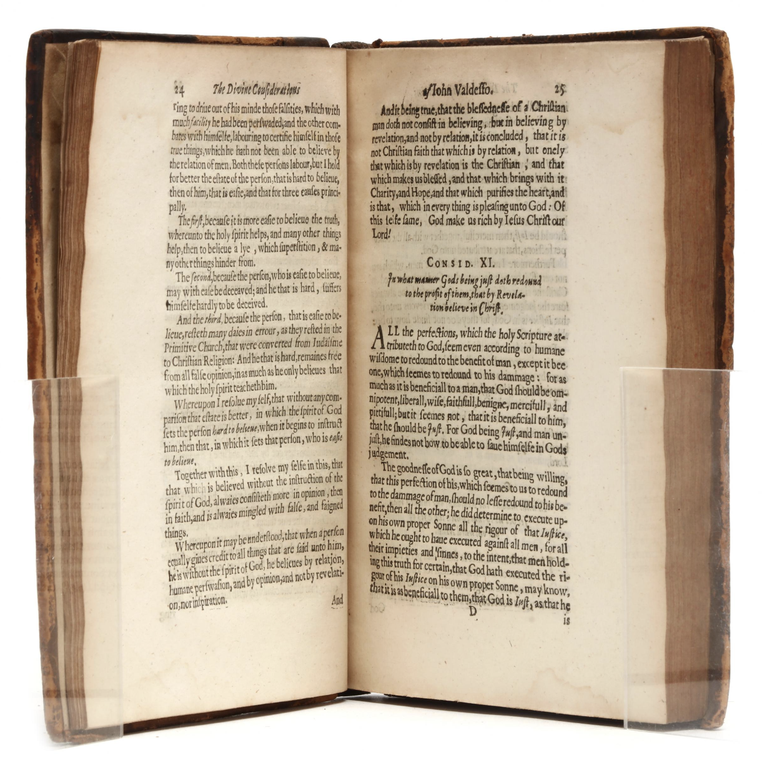The hundred and ten considerations of Signior John Valdesso: treating of those things which are most profitable, most necessary, and most perfect in our Christian Profession. Written in Spanish, Brought out of Italy by Vergerius, and first set forth in Italian at Basil by Cælius Secundus Curio, Anno 1550. Afterward translated into French, and Printed at Lions 1563. and again at Paris 1565. And now translated out of the Italian Copy into English, with Notes. Whereunto is added an Epistle of the Author's, or a Preface to his Divine Commentary upon the Romans. I.Cor.2. [...]
The hundred and ten considerations of Signior John Valdesso: treating of those things which are most profitable, most necessary, and most perfect in our Christian Profession. Written in Spanish, Brought out of Italy by Vergerius, and first set forth in Italian at Basil by Cælius Secundus Curio, Anno 1550. Afterward translated into French, and Printed at Lions 1563. and again at Paris 1565. And now translated out of the Italian Copy into English, with Notes. Whereunto is added an Epistle of the Author's, or a Preface to his Divine Commentary upon the Romans. I.Cor.2. [...]
Metodi di Pagamento
- PayPal
- Carta di Credito
- Bonifico Bancario
- Pubblica amministrazione
- Carta del Docente
Dettagli
- Anno di pubblicazione
- 1638
- Luogo di stampa
- Oxford
- Autore
- VALDÉS, Juan de (ca. 1490-1541)
- Editori
- Printed by Leonard Lichfield, Printer to the University
- Soggetto
- seicento
- Stato di conservazione
- Buono
- Lingue
- Italiano
- Legatura
- Rilegato
- Condizioni
- Usato
Descrizione
4to (197x146 mm). [32], 311, [13] pp. Collation: *-****4 A-Rr4 Ss2. Woodcut initials and printer's decorations. Blind-tooled leather boards, with raised bands and gilt title on spine (boards scuffed, with significant edgewear, small losses to leather and cracking at joints, light cracking at front hinge, binding still sturdy). From the collection of Prof. Roberto Severino, Washington, D.C. Pages lightly toned with minimal foxing and occasional small chip or frayed bottom edge, light damp staining throughout, small ink stains in the lower margins of pp. 252-253 not affecting the text. A good, genuine copy.
Extremely rare first English edition of this collection of letters and essays put together by the author's friends, in the transaltion of Nicholas Ferrar (1592-1637), the founder of Little Gidding, the ‘Arminian Nunnery', where the Ferrar family lived under a definite religious rule from 1625 to 1646. The edition also contains a publisher's note to the reader, the Considerations by George Herbert (1593-1633) with remarks concerning the dubious and offensive passages in the text, Curione's introduction (dated from Basle, May 1st, 1550), Thomas Jackson's approbation, a commendatory letter of Herbert to his friend Ferrar, the dedicatory epistle of Valdes to his Commentary upon the Romans addressed to Giulia Gonzaga, and the errata.
The Spanish huminist and religious reformer Juan de Valdes was mostly active in Naples, where he became the spiritual center of a group of prominent men and women anxious for reform and spiritual revival in the church, to whom belonged, among others, Giulia Gonzaga and Vittoria Colonna. Though he remained a Catholic, he paved the way for Protestant ideas by his emphasis on religious feeling and his disregard of ecclesiastical authority; and after his death, many of his friends, among them Peter Martyr and Bernardino Ochino, left the Catholic Church.
“The Spanish original [Ciento y diez Consideraciones] of Juan de Valdés Hundred and ten divine considerations is lost, but there have been published twelve editions of translations. From Italian [Le Cento e dieci divine Considerazioni, first printed in 1550] they have been translated into five other languages. Three editions appeared in English. To the editor of the first English translation, who scrupulously hesitated to publish it, on account of certain passages in the book, George Herbert wrote in 1638: ‘I wish you by all means to publish it, for these three eminent things observable therein: First, that God in the midst of Popery should open the eyes of one to understand and express so clearly and excellently the intent of the gospel in the acceptation of Christ's righteousness (as he sheweth through all his Considerations), a thing strangely buried and darkened by the adversaries, and their great stumbling block. Secondly the great honour and reverence which he every where bears towards our dear master and lord, concluding every Consideration almost with his holy name, and setting his merit forth so piously, for which I do so love him, that, were there nothing else, I would print it, that with it the honour of my lord might be published. Thirdly, the many pious rules of ordering our life, about mortification and observation of God's kingdom within us and the working thereof, of which he was a very diligent observer. These three things are very eminent in the author, and overweigh the defects (as I conceive), towards the publishing thereof' […] Soon, after the death of Valdés, Vermiglio and Occhino left Italy, where liberty of preaching was no longer left them. For a short period the press at Venice was still suffered to spread evangelical literature. The Benefit of Christ was printed there and circulated in tens of thousands of copies. About the year of the opening of the Council of Trent several works of Juan de Valdés were published at Venice. Together with his brother's dialogue on the sack of Rome, there appeared Juan's Dialogue between Mercury an




